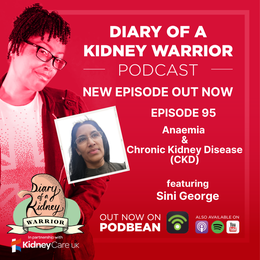Your anaemia and CKD questions
Why do people with kidney disease get anaemia?
Your kidneys play a vital role in creating red blood cells. Those red blood cells carry oxygen around your body.
Anaemia means you don’t have enough healthy red blood cells to carry sufficient amounts of oxygen to your body’s tissues.
People with chronic kidney disease (CKD) have a higher risk of anaemia because of a hormone called erythropoietin or EPO. This hormone is made by the kidneys and it instructs your bone marrow to make red blood cells. Damaged kidneys produce less EPO, which in turn means your body makes fewer red blood cells.
Does everyone with CKD have anaemia?
Not everyone with CKD has anaemia, but rates are high. According to a recent study, 60% of non-dialysis CKD patients and 93% of dialysis-dependent patients have anaemia.
As kidney disease progresses, less EPO is produced by the kidneys. This means your body doesn’t produce as many healthy red blood cells, which can cause anaemia.
How will I know if I have anaemia?
A simple blood test is all it takes to discover if you have anaemia. Your blood will be checked for levels of a protein called haemoglobin (HB), which is found in red blood cells. This protein carries oxygen from the lungs to all parts of the body. If your results show low HB, you probably have anaemia.
How often you should have your HB levels tested depends on your level of kidney function, explains Dr Richard Hull, Consultant Kidney Specialist at St George's University Hospitals NHS Foundation Trust and New Victoria Hospital in London. “If you are a CKD patient then you may be investigated for anaemia if you develop symptoms such as tiredness, shortness of breath, lethargy and palpitations,” he says. “If you are found to have a HB level that falls to 110g a litre or less, further investigations may be carried out to measure your iron levels.”
Why does anaemia need to be treated?
When you have anaemia, your organs may not get all the oxygen they need. For this reason, anaemia can increase the chance of developing heart problems, for example. If the heart gets less oxygen than normal, it has to work harder to pump enough red blood cells around the body.
People with CKD and anaemia may also have a higher risk of stroke.
Common symptoms of anaemia can include
- tiredness
- headaches
- sleep problems
You can also experience
- body aches
- trouble concentrating
- dizziness
- fainting
Some people also find they
- feel cold all the time
- experience restless leg syndrome
- have heart palpitations.
With effective anaemia treatment, you can reduce your risk of all these symptoms.
How will my anaemia be treated?
You may be offered iron tablets or an iron infusion. “Oral iron in tablet form is often the first line treatment, but if patients do not respond or have advanced kidney disease we often use intravenous iron as it’s more effective,” says Dr Hull.
There are also medications that can stimulate the bone marrow to produce red blood cells. These are known as erythropoiesis stimulating agents or ESAs.
What do I need to know about anaemia treatments?
While most people tolerate treatment without a problem, anaemia treatments can have side effects.
Iron tablets can bring on digestive issues such as constipation, nausea, vomiting, abdominal pain and diarrhoea.
Intravenous iron treatments carry a risk of allergic reactions, headache, nausea and vomiting. Given as an injection, iron can also sometimes damage a vein. Some people also experience a metallic taste, joint pain or muscle ache after an infusion. “These risks are very uncommon and most patients tolerate treatment without a problem,” says Dr Hull.
Speak to your kidney care team about any side effects you experience as there may be alternative treatment options you could try.
What should I ask my doctor about anaemia?
If you have CKD, it’s important to talk to your kidney team about anaemia. If tests show you are anaemic, your doctor will be able to talk you through the treatments available to help you choose what’s best for you. Your kidney team can also advise on any lifestyle changes that may help control anaemia.
This patient information resource has been made possible with a financial contribution from GSK. GSK has had no editorial input into or control over the content which has been independently owned and created by Kidney Care UK.




